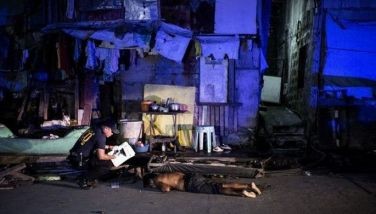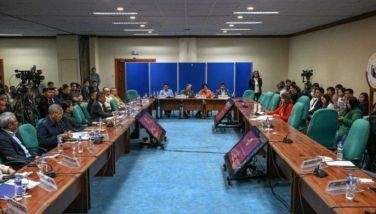Deadly clan wars a way of life in Mindanao
June 27, 2005 | 12:00am
In the lawless southern Philippines, where an ancient Mafia-style honor code still thrives, all it takes to spark an orgy of bloodshed is something as trivial as a stolen spare tire.
And so it did. A tire theft in 1998 led to two killings, a kidnapping and pillage as two branches of a Muslim clan settled a dispute the way it had been done for generations on Mindanao island.
First Dalomabi Bula’s nephew killed a second cousin accused of the crime.
Then, in a revenge attack, Bula’s husband’s construction business in Marawi City was targeted by the dead man’s family which looted one of its project sites, killed a worker and kidnapped another.
English professor Bula, whose father died in a clan war sparked by cattle rustling in the early 1950s, says burying the hatchet under the terms of the honor code, called rido, extracts a heavy price.
"Rido has been with all of us, Muslims and non-Muslims alike, since Adam and Eve were taken out of paradise. Rido will stay with us," she sighs.
Rido is the term in local Muslim dialects referring to killings and other forms of violence sparked by perceived personal affront.
"A violation of this deep sense of personal honor rationalizes revenge and will legitimize killing someone whether he is good or bad and regardless of whether the cause of the conflict was legal or illegal," says Jamail Kamlian of Mindanao State University’s (MSU) Institute of Technology.
Studies jointly funded by the United States Agency for International Development (USAID) and the Asia Foundation have documented 1,220 clan conflicts since 1930 in 11 provinces of Mindanao, home to the mostly Roman Catholic nation’s four million-strong Muslim minority.
The vicious cycle of violence has left 4,512 people dead and more than 3,000 other people injured or missing.
Bloody inter-clan conflict "is something that has happened throughout history," says Steven Rood, country director of the Asia Foundation, citing counterparts in other countries and cultures.
Researchers from Mindanao’s Ateneo de Zamboanga University and Notre Dame University say deadly family quarrels have erupted over the flimsiest disputes, such as women eloping with men who were out of favor with their respective families or who failed to pay a dowry. They also break out over land disputes, electoral contests, or unpaid debts.
Sometimes lasting for generations, the deadly feuds between family branches, rival clans, or different ethnic groups, have blurred the roots of the bloodshed in a region that has seen some 120,000 deaths amid a relatively recent Muslim separatist guerrilla war.
On Mindanao clan conflict is closely tied to "problems of governance" on the restive island and the ready availability of guns in the black market, says Abhoud Syed Lingga of the Institute of Bangsamoro Studies, based in Cotabato City.
Instead of going to the police or the courts, warring parties seek to settle their own disputes.
Army Maj. Dickson Hermoso says that "in some cases, some clans will join the armed forces, the police and paramilitary forces to get back at another clan known to be sympathetic to the Muslim rebels."
But shooting is the most common method of revenge. — AFP
And so it did. A tire theft in 1998 led to two killings, a kidnapping and pillage as two branches of a Muslim clan settled a dispute the way it had been done for generations on Mindanao island.
First Dalomabi Bula’s nephew killed a second cousin accused of the crime.
Then, in a revenge attack, Bula’s husband’s construction business in Marawi City was targeted by the dead man’s family which looted one of its project sites, killed a worker and kidnapped another.
English professor Bula, whose father died in a clan war sparked by cattle rustling in the early 1950s, says burying the hatchet under the terms of the honor code, called rido, extracts a heavy price.
"Rido has been with all of us, Muslims and non-Muslims alike, since Adam and Eve were taken out of paradise. Rido will stay with us," she sighs.
Rido is the term in local Muslim dialects referring to killings and other forms of violence sparked by perceived personal affront.
"A violation of this deep sense of personal honor rationalizes revenge and will legitimize killing someone whether he is good or bad and regardless of whether the cause of the conflict was legal or illegal," says Jamail Kamlian of Mindanao State University’s (MSU) Institute of Technology.
Studies jointly funded by the United States Agency for International Development (USAID) and the Asia Foundation have documented 1,220 clan conflicts since 1930 in 11 provinces of Mindanao, home to the mostly Roman Catholic nation’s four million-strong Muslim minority.
The vicious cycle of violence has left 4,512 people dead and more than 3,000 other people injured or missing.
Bloody inter-clan conflict "is something that has happened throughout history," says Steven Rood, country director of the Asia Foundation, citing counterparts in other countries and cultures.
Researchers from Mindanao’s Ateneo de Zamboanga University and Notre Dame University say deadly family quarrels have erupted over the flimsiest disputes, such as women eloping with men who were out of favor with their respective families or who failed to pay a dowry. They also break out over land disputes, electoral contests, or unpaid debts.
Sometimes lasting for generations, the deadly feuds between family branches, rival clans, or different ethnic groups, have blurred the roots of the bloodshed in a region that has seen some 120,000 deaths amid a relatively recent Muslim separatist guerrilla war.
On Mindanao clan conflict is closely tied to "problems of governance" on the restive island and the ready availability of guns in the black market, says Abhoud Syed Lingga of the Institute of Bangsamoro Studies, based in Cotabato City.
Instead of going to the police or the courts, warring parties seek to settle their own disputes.
Army Maj. Dickson Hermoso says that "in some cases, some clans will join the armed forces, the police and paramilitary forces to get back at another clan known to be sympathetic to the Muslim rebels."
But shooting is the most common method of revenge. — AFP
BrandSpace Articles
<
>
- Latest
- Trending
Trending
Latest
Trending
Latest
Recommended




























